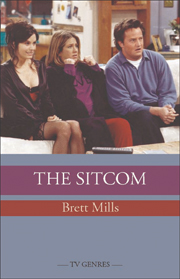4 - Programmes
Published online by Cambridge University Press: 05 August 2013
Summary
If a show is funny you don't mind hearing other people laugh on the laugh track: if it's not then it irritates you.
(Gareth Carrivick 2005)The aim of this book is to demonstrate the variety of ways in which sitcom can be explored generically, showing how genre is a process by which the sitcom comes into being. Definitions of sitcom, as well as industrial understandings of the term, have already been explored; this chapter moves on to look at a range of programmes commonly referred to as sitcoms. In doing so, it engages in work which is perhaps the most common in genre studies: analysis of programmes. Jason Mittell notes how ‘Most analyses of genres have analyzed texts because they are the most imminent and material objects of media’ (2004: 8), referring to this approach as a ‘textualist assumption’ (2–11). Yet this book, and other studies of genre such as those of Mittell, Jane Feuer (1992) and Robert C. Allen (1985) have argued that programmes are only one aspect of genre, whose meanings instead come into play via understandings of genre which circulate within industries and audiences. This chapter suggests that the element central to the ways in which sitcoms function as programmes is the comic impetus, and it is therefore this aspect which should be prioritised when engaging in analysis of specific episodes and series. Foregrounding the comic impetus helps explain why it is that certain television programmes may be labelled ‘sitcom’ while others are usually not.
- Type
- Chapter
- Information
- The Sitcom , pp. 75 - 99Publisher: Edinburgh University PressPrint publication year: 2009



